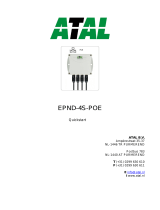Page is loading ...

Specifications are subject to change without notice ie-snc-n-p86xx-09
Thermometers and hygrometers Web Sensor P86xx
with power over Ethernet - PoE
PRODUCT DESCRIPTION
Thermometers and hygrometers Web Sensor P86xx with power over Ethernet are designed to measure temperature and relative
humidity of air. Devices are available either with built-in sensor for temperature measurement in place of installation or with CINCH
connectors for external probes connection. Devices can be powered from external power supply adapter or by using power over
Ethernet – PoE.
Measured values can be read and then processed using an Ethernet connection. The following formats of Ethernet communication are
supported: www pages with user-design possibility, Modbus TCP protocol, SNMPv1 protocol, SOAP protocol and XML. The instrument
may send also a warning message if the measured value exceeds adjusted limit. The messages can be sent up to 3 e-mail addresses or
to Syslog server and can be sent by SNMP Trap too. The alarm states are also displayed on the websites. The device setup can be made
by the TSensor software (see http://www.cometsystem.com) or using the www interface.
type * measured value design mounting
P8610 temperature built in temperature sensor wall
P8611 temperature, relative humidity 1-channel transducer for external probe using wall
P8641 temperature, relative humidity 4-channel transducer for external probe using wall
* models PxxxxZ are custom - specified devices
INSTALLATION AND OPERATION
The devices are designed for wall mounting with two screws or bolts. Pay attention to the location of the device and probe. Incorrect choice
of working position could adversely affect accuracy and long-term stability of measured values. The Web Sensor with attached DSRH/C
or DST/C probe install always vertically with the sensor cover downwards. Devices don´t require any special operation and maintenance.
We recommend you periodic calibration for measurement accuracy validation.
DEVICE SETUP
For network device connection it is necessary to know new suitable IP address. The device can obtain this address automatically from a
DHCP server or you can use the static IP address, which you can get from your network administrator.
According to the “Device connection procedure” (see next page) connect the external probes, Ethernet cable and power adapter (when
using the Ethernet connection without PoE). Then you run the latest version of TSensor software, set the new IP address, configure the
device in accordance with your requirements and finally store the settings. The device setting can also be made by the web interface (see
manual for devices at www.cometsystem.com ). The IP address of each device is set by the manufacturer to 192.168.1.213.
ALARM LIMITS AND ERROR STATES
It is possible to set an upper limit, lower limit, time delay (for alarm activation) and hysteresis (for alarm clearing) to each measured channel.
If the measured value exceeds the upper limit for longer than the set time delay, the alarm occurs and a warning e-mails or traps are send.
When the measured value drops below the upper limit minus hysteresis, the alarm will be cancelled. If the measured value drops below
the lower limit, alarm is causes similar.
Alarm message is sent when new alarm occurs. You can set re-sending of warning e-mails too. In case of power failure or reset the device
(e.g. changing the configuration) will new alarm state evaluated and new alarm message will be sent.
Device continuously checks its state during operation and if an error appears, it is displayed Error instead measured value. The detailed
description of the error messages is given in the user manual.
SAFETY INSTRUCTIONS
- Don’t use and don’t store the relative humidity probes without a sensor cover.
- It is not recommended to use the relative humidity probes for long time under condensation conditions.
- Don’t connect or disconnect thermometers while power supply voltage is on.
- Don’t use the device without the cover.
- Installation, electrical connection and commissioning should be performed by qualified personnel only.
- Use the power adapter according to technical specifications and approved according to relevant standards only.
- The external probe cable should be located as far as possible from potential interference sources.
- If it is necessary connect the device to the Internet, properly configured firewall must be used.
- The device should not be used for applications, where malfunction could cause to injury or damage to property.
- Devices contain electronic components, it needs to liquidate them according to legal requirements.
- To supplement the information provided in this data sheet, use the manuals and other documentations which
are available at www.cometsystem.com.

/
